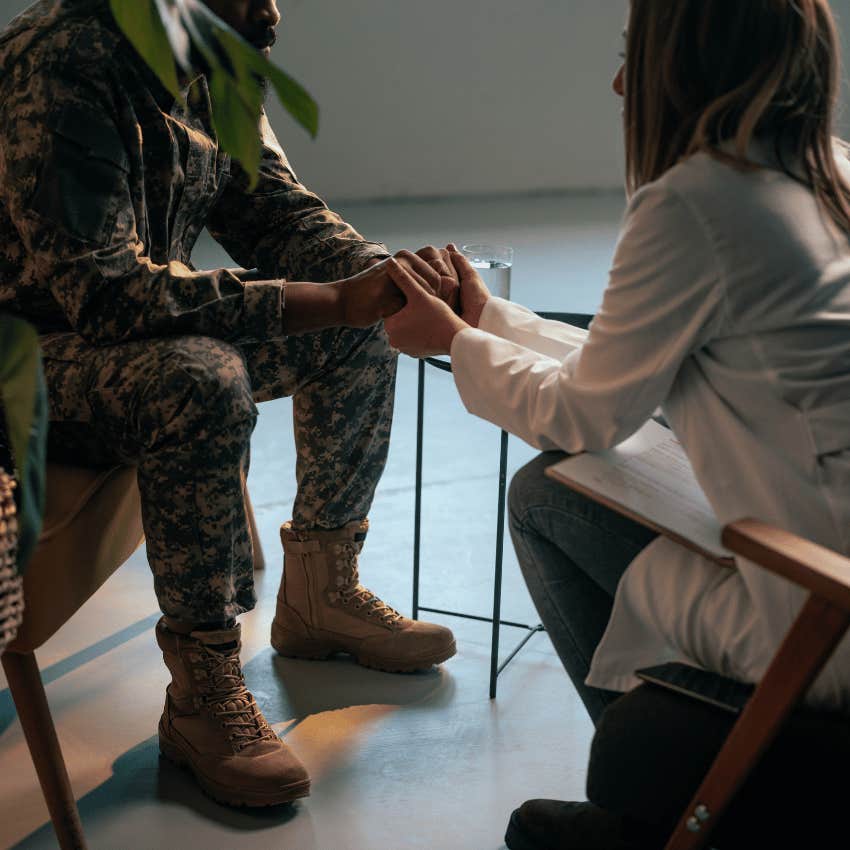My Unresolved Trauma Followed Me Into The Military — 'I Should've Waited To Enlist'
When I enlisted in the military at 21, I had no idea that the emotional bag I brought with me was full of unresolved issues.
 Peopleimages.com - YuriArcurs | Canva
Peopleimages.com - YuriArcurs | Canva Editor's Note: This is a part of YourTango's Opinion section where individual authors can provide varying perspectives for wide-ranging political, social, and personal commentary on issues.
When I enlisted in the military at 21, I had no idea that the emotional bag I brought with me was full of unresolved issues. I want to think that if I had known the severity of these issues, I would have waited to enlist.
Research from the Psychological Health Center of Excellence has shown that many active duty service members face experiences such as deployments, combat exposure, high operations tempo, and rigorous training regimens that may increase their level of risk for psychological health problems above that of the general population. Because of these differences, the center provides prevalence estimates for the active duty force.
By tracking trends in the prevalence of psychological health problems over time, the DOD is better positioned to develop effective prevention and treatment programs. Psychological health conditions among military personnel can range from more acute concerns, like adjustment disorders, to situations that may impact us for longer, like post-traumatic stress disorder, depression, or anxiety.
Six months after arriving at my first duty station, I made an appointment with the Behavioral Health Clinic.
Why did I wait so long? Well, eight weeks of boot camp, 19 weeks of ‘A’ school, and the seven-ish months pushed me past my first 365 days of continuous service.
Passing this milestone meant I was no longer considered to have an “entry-level status,” which meant the powers that be could not administratively separate me on the grounds of a failure to adapt without also needing to show unsatisfactory performance or conduct.
 bbernard | Pexels
bbernard | Pexels
In uniform, I was good at my job, respectful of my leadership, and always willing to do more work if needed. The issues started to come up in the early mornings, before work, and in the evenings, after work.
I know now that the timing of my racing and restless thoughts wasn't a coincidence but a result of my mind having nothing else to focus on. My workspace had a showtime of 0730 and an estimated end time of 1600 (4 p.m.). I would wake up at 0400 to go on a run and then be at work by 0600. Then I started to find myself staying at work past 1600. I now recognize this pattern of behavior as my psyche’s way of creating a sense of safety and familiarity for me.
Then, I started to have issues with sleep, which would affect my mood, which is what ultimately led me to seek mental health support. In my 22 years, I have never experienced issues with falling or staying asleep.
My first duty station was small, so getting an appointment wasn’t difficult, nor did they have an extremely long wait time. If I remember correctly, I was able to get an appointment the same week I had called them. A peer suggested a doctor they thought would fit me well. My tips, tricks, and skills came directly from this doctor. She was a civilian but had worked with active-duty service members for several years.
 Zoran Zeremski | Shutterstock
Zoran Zeremski | Shutterstock
My first therapist while in the military set me up for success but also set my expectations high.
With this therapist, I was brave enough to speak my truths out loud. Had it been anyone else, I think I would’ve remained closed off, only giving what I needed to.
My next duty station after attending a ten-week-long ‘C’ school was an operational command, essentially meaning the opportunity to participate in operations and exercises. Numbers matter at this kind of duty station. The unspoken goal of medical, dental, and mental health services is to keep you ready and deployable.
I shouldn’t have been surprised at the lack of support I felt from my new therapist, but I was. This isn't a case of gaslighting or medical neglect, in my opinion. The military is a business that runs 24/7, 365 days a year. Every decision and every recommendation is weighed against the goals and interests of the military.
I experienced exhaustion, re-emergence of sleep issues, irritability, loss of enjoyment, helplessness, and headaches. My symptoms were in line with what you’d expect to see in burnout. My treatment plan was to sleep, do physical activity, and surround myself with friends. Spoiler alert: it didn’t help.
Because of the terrible access to care at my last duty station, I was allowed to see a therapist in the community who was not affiliated with the military. Working with them had its benefits as well as its drawbacks.
Because of the proximity to several bases, servicemembers made up most of the practice’s patient population. My therapist worked closely with my military psychiatrist, and I was always a part of the conversation. Their collaborative approach also helped me feel comfortable trying EMDR for the first time.
 Pixel-shot | Shutterstock
Pixel-shot | Shutterstock
I have a lot to thank the military for but the impact of access to mental health services has been invaluable.
Undoubtedly, one of the great resources our military offers its members is unlimited access to mental health services. Although mental health has been pushed to the forefront by military leaders, a significant percentage of the military is still made up of the generation that looked down on mental health struggles or believed they weren’t real.
According to research, the military population’s higher need for mental health care does not always translate into higher use of mental health care. Military deployments and frequent relocations make it difficult to maintain consistent access to treatment.
Many active duty service members live in places with minimal mental health service capacity. Research findings suggest that realigning military treatment facility psychiatrists across communities with shortages and high-capacity military treatment facilities would be beneficial.
I urge friends still on active duty to attempt therapy. Not everyone will need two therapy sessions a week, as I did at my worst. They might need once a month like I had at my best.
If you or somebody that you know is experiencing a mental health crisis, there is a way to get help. Call SAMHSA’s National Helpline at 1-800-662-HELP (4357) or text "HELLO" to 741741 to be connected with the Crisis Text Line.
Monica Robles is a California-based writer and an editorial intern for YourTango.

